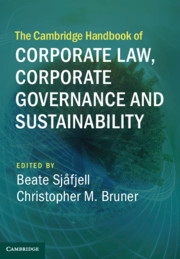Book contents
- Reviews
- The Cambridge Handbook of Corporate Law, Corporate Governance and Sustainability
- The Cambridge Handbook of Corporate Law, Corporate Governance and Sustainability
- Copyright page
- Dedication
- Contents
- Contributors
- Forewords
- Preface
- Introduction
- Part I Global Business and Fragmented Regulation
- Part II Corporate Law, Financial Markets and Sustainability
- Part III Corporate Law, Corporate Governance and Sustainability: Case Studies
- 10 Progress Is Possible
- 11 Green but Not Enough
- 12 The Australian Paradox
- 13 Moving beyond Virtue Signalling
- 14 The EU as a Potential Norm Creator for Sustainable Corporate Groups
- 15 Market-Led Sustainability through Information Disclosure
- 16 Law, Culture and Sustainability
- 17 Stakeholder Value versus Corporate Sustainability
- 18 Worker Participation, Sustainability and the Puzzle of the Volkswagen Emissions Scandal
- 19 Corporate Sustainability and Shareholder Activism in the Netherlands
- 20 Old-Fashioned yet Innovative
- 21 The Unsuccessful Pursuit for Sustainability in Italian Business Law
- 22 Sustainability and the Transformation of the Socialist Corporation into the Private Corporation
- 23 Limited Demand, Limited Supply
- 24 The Pacific Alliance
- 25 Social Environmentalism and Corporate Capture
- 26 The Social and Ethics Committee
- 27 Reforming the Nigerian Oil and Gas Sector
- 28 Enlightenment or Resistance?
- 29 The Community Company as a Vehicle for Sustainability in Solomon Islands
- 30 What Does It Mean to Be Sustainable?
- 31 Shareholder Voting and Corporate Sustainability in China
- 32 Corporate Governance Reform, Social Norms and Sustainability in Japanese Companies
- 33 Achieving Sustainable Development Goals in India
- 34 Sustainability and Legislated Corporate Social Responsibility in Indonesia
- 35 Islamic Financial Institutions and Corporate Sustainability
- 36 Leaders or Laggards?
- Part IV Potential Drivers for Change
- Conclusion
- Index
23 - Limited Demand, Limited Supply
Corporate Governance and Sustainability in Russia
from Part III - Corporate Law, Corporate Governance and Sustainability: Case Studies
Published online by Cambridge University Press: 25 November 2019
- Reviews
- The Cambridge Handbook of Corporate Law, Corporate Governance and Sustainability
- The Cambridge Handbook of Corporate Law, Corporate Governance and Sustainability
- Copyright page
- Dedication
- Contents
- Contributors
- Forewords
- Preface
- Introduction
- Part I Global Business and Fragmented Regulation
- Part II Corporate Law, Financial Markets and Sustainability
- Part III Corporate Law, Corporate Governance and Sustainability: Case Studies
- 10 Progress Is Possible
- 11 Green but Not Enough
- 12 The Australian Paradox
- 13 Moving beyond Virtue Signalling
- 14 The EU as a Potential Norm Creator for Sustainable Corporate Groups
- 15 Market-Led Sustainability through Information Disclosure
- 16 Law, Culture and Sustainability
- 17 Stakeholder Value versus Corporate Sustainability
- 18 Worker Participation, Sustainability and the Puzzle of the Volkswagen Emissions Scandal
- 19 Corporate Sustainability and Shareholder Activism in the Netherlands
- 20 Old-Fashioned yet Innovative
- 21 The Unsuccessful Pursuit for Sustainability in Italian Business Law
- 22 Sustainability and the Transformation of the Socialist Corporation into the Private Corporation
- 23 Limited Demand, Limited Supply
- 24 The Pacific Alliance
- 25 Social Environmentalism and Corporate Capture
- 26 The Social and Ethics Committee
- 27 Reforming the Nigerian Oil and Gas Sector
- 28 Enlightenment or Resistance?
- 29 The Community Company as a Vehicle for Sustainability in Solomon Islands
- 30 What Does It Mean to Be Sustainable?
- 31 Shareholder Voting and Corporate Sustainability in China
- 32 Corporate Governance Reform, Social Norms and Sustainability in Japanese Companies
- 33 Achieving Sustainable Development Goals in India
- 34 Sustainability and Legislated Corporate Social Responsibility in Indonesia
- 35 Islamic Financial Institutions and Corporate Sustainability
- 36 Leaders or Laggards?
- Part IV Potential Drivers for Change
- Conclusion
- Index
Summary
This chapter describes important elements of the corporate governance system in Russia, such as the structure of stock ownership, the basic laws and regulations. Special attention is given to related-party transactions, the use of foreign law and the new Corporate Governance Code. The chapter summarizes the empirical literature on the relation between corporate governance and corporate sustainability in emerging markets and provides evidence on measures of corporate sustainability and the quality of corporate governance in Russia. It is argued that the weakness of civil society and independent media effectively limits the demand for corporate sustainability. This demand is therefore potentially represented only by the government, which in turn faces a conflict of interest as the regulator and as a shareholder of large companies, in particular in the oil and gas sector.
- Type
- Chapter
- Information
- Publisher: Cambridge University PressPrint publication year: 2019

